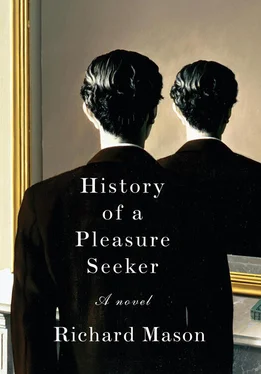Maarten coughed. The sound brought echoes of his snoring and reminded her that he had done no more than kiss her — and that all too rarely — since Egbert’s birth. For ten years she had submitted to this denial of affection and after one explicit rejection on the night of their eighteenth wedding anniversary had not again sought to arouse her husband’s interest. What Jacobina Vermeulen-Sickerts did not know was that Maarten had woken on many nights to find himself stiff with dreaming of her and feasted his eyes on her warm body beside him. It was not because he did not wish to touch his wife that he did not touch her.
It was because of a promise he had made to God.
Maarten Vermeulen was twelve years old when he found in the ruins of a burnt-out farmhouse a charred section of beam in the shape of a cross and took this as divine confirmation of that morning’s sermon. It was a winter’s day of uncompromising harshness and the flames of hell had been vividly evoked by the charismatic young vicar of the Johanneskerk. This gentleman had read every word John Calvin ever wrote and had no time for spineless modernists who softened his teachings. Walking home from church, Maarten said nothing to his parents; but as soon as they had eaten he set out across the dunes of Drenthe to look for a sign.
He was at first reluctant to believe that God had decided, long before his birth, whether he was to be saved or damned; but the burned beam convinced him that the vicar was right. God had decided. Moreover, His decision was final and irrevocable. This begged the further question: what was the Almighty’s judgment in his, Maarten Vermeulen’s, specific case? When he pressed for an answer the following Sunday he was informed that such mysteries are not revealed before the End but that clues might be deduced from his behavior through life.
From that day, the question of whether or not he was predestined for salvation consumed a significant portion of Maarten’s time and energies, and though he searched for a sign and detected many, none was ever as unequivocal as the charred cross he had found.
His career and the good works he went to great lengths to perform gave him some cause for comfort — as did the delectable Jacobina Sickerts’ decision to marry him, though she had grander suitors. God had smiled on his idea of transporting ice great distances to slow the decay of perishable food. The fledgling concern had often come close to failure, but each time God had intervened and rescued it. Once he was reliably prosperous, Maarten had given 12 percent of his profits away each year: 20 percent more than the Bible instructed. He hoped his generosity was a sign that he was destined for heaven, but to make sure he went further than passive philanthropy. He threw his considerable energies into improving the lot of the less fortunate. He built bread factories and founded societies for land reclamation. He extended the city beyond the Singelgracht and built safe, watertight houses for the poor. He gave his workers a week’s annual holiday and paid for their care when they fell sick and was rewarded by God with two healthy girls — but no son. When he still had no male heir after fifteen years of marriage he began to take this as evidence of heavenly disfavor, and when Jacobina fell pregnant for the third time he fasted for three days and made a bargain with God.
If the child were a boy, he would abstain forever from the pleasures of the flesh.
The child was a boy, and for a time Maarten felt serenely secure. But he was soon punished for this presumption. His boy did not behave as other boys did. Egbert did not like to run and play. As he grew bigger he slipped further into a world others could not see. When he began to refuse to venture beyond the house, Maarten took this to mean that the future of his own soul hung in the balance. He continued to fight against his sexual desires, with no thought for the impact his self-restraint would have on his wife. But though his business prospered greatly, his heir’s behavior grew more, not less, odd; and sometimes he woke in the night from lurid dreams of hell and its eternal fires.
In many respects Maarten Vermeulen-Sickerts was a rational man, but the doctrine of predestination, once absorbed, proved impossible to shake; and because he shared his fears with no one, he was compelled to face them alone. Piet’s polished performance, superior in every way to the embarrassed awkwardness of Egbert’s previous tutors, was deeply reassuring. After the party had broken up and he had said his prayers, he went to sleep feeling calmer than he had in years.
Piet took off his tie and began to unbutton his shirt, standing in front of the mirror in his comfortable new bedroom. He felt giddy with relief.
There was a knock at the door. Didier Loubat put his head round it. “Did you survive?”
“I think so.”
“You did much better than the last man at his first dinner. It’s important not to cross the girls. D’you want a drink?”
“I thought it wasn’t allowed.”
“Blok’s in bed, and the witch doesn’t come up here after lights out. I’ve got Chartreuse.”
“I’m in, then.” Piet spoke nonchalantly, but in fact he had never tasted Chartreuse and was eager to try it.
“I’ll get it. I suppose you’ll need nightclothes, too.”
Didier disappeared and returned with two chipped tumblers and a bottle containing five inches of emerald liquid. He had taken his tie off and opened two buttons on his shirt. “Borrow these till yours arrive.” He handed Piet a pair of blue-and-white-striped pajamas, sat on the edge of the bed and poured the drinks. “I’m glad you’ve come. The last few tutors have been stuck up beyond belief.”
Though Didier Loubat was a footman, he was a good footman and did not consider himself beneath anyone else who earned an honest wage. When he saw that there was no condescension in Piet’s manner, he decided to reward the beauty of his face by giving him the benefit of an insider’s experience. “You’ll enjoy yourself here if you’re sensible.” He handed Piet his cup. “It’s much the best house in Amsterdam and the family’s all right once you know how to handle them. The one to watch out for is Constance. She expects every man to fall in love with her.” He raised his glass in a silent toast. “But you mustn’t. If Vermeulen catches you with one of his daughters you’ll finish at the bottom of the Herengracht with lead weights tied to your balls.”
“I’ll remember that.”
“Gents as handsome as us need to be wary, that’s all.” Didier made this observation without embarrassment. He had a lean, athletic frame, high cheekbones and a seductively crooked smile. The simmering arousal of Piet’s interview with Jacobina remained and he wondered briefly whether Didier might help him relieve it. No . He was in the great city now. It was time to put away the habits of boyhood. He drained his glass in one manly swig and coughed.
Didier looked horrified. “That’s last year’s bonus. Treat it politely or you’ll miss it.” He poured Piet another inch. Consumed sparingly, the Chartreuse was delicious. Didier smiled to show that he did not judge Piet for his lack of experience with exotic liqueurs.
Piet was touched by this and relieved to have made an error so early on in their acquaintance. It removed the necessity of feigning sophistication. “What about Louisa?” he asked.
“Never says a word, but she’s sharp as a dagger. Nothing escapes her.”
“Do the sisters get on?”
“They adore each other. But if they decide you’re affected or stupid, beware. Don’t let their politeness fool you. They’re vicious when they choose.”
“How so?”
“They like to humiliate people — but subtly, so their target never knows. Lately they’ve taken to leading their victim through a conversation in alphabetical order. Very funny when the poor fool doesn’t catch on.”
Читать дальше












